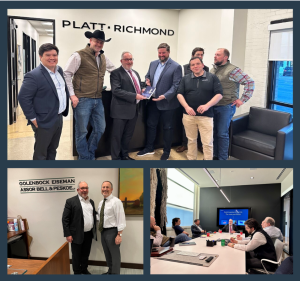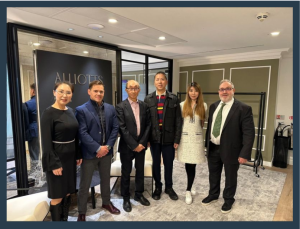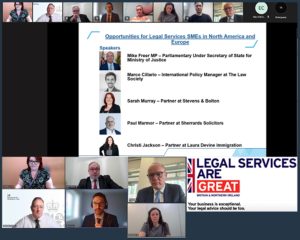UK/USA relations in a post-brexit world!
Paul Marmor, Head of Litigation and International Services, recently visited the offices of our Alliott Global Alliance (“AGA”) correspondent law firms in Dallas and New York – Platt Richmond and Golenbock Eiseman Assor Bell & Peskoe – and gave a presentation to each on the topic of UK/USA relations post-Brexit, where Paul explained how the trading relationship has been affected in a post-Brexit world.
Paul set out the good, the bad and the ugly from all perspectives. Paul also gave the same presentation to AGA’s North American annual meeting in Palm Springs, California, attended by over 70 members from the USA, Canada and Mexico.
Paul is pictured presenting a ceremonial gift to each law firm, with the Managing Partner of Platt Richmond, Bob Daniels, and a number of his colleague, and with Jeff Berger, the Managing Partner of Golenbocks. Paul is presenting David Gauke’s book entitled The Case for the Centre Right, which is a collection of essays on politics in the UK at this time, with special emphasis on Brexit, including contributions from Rory Stewart, Daniel Finklestein and Dominic Grieve and others.

For more information about our connectivity, clients and friends across the Americas, through our involvement in the AGA, the American Bar Association and the International Bar Association, and for our legal perspectives relating to Brexit, then please reach out to Paul Marmor on +44 20 7478 9010 or pdm@sherrards.com, or visit www.sherrards.com.
Sherrards continue to expand their global partnerships
Paul Marmor, Partner and Head of Dispute Resolution & International, and Laurel Zhang, Head of China and South East Aisa Desk, recently met with Senior Partner Alex HY Leung of Leung and Co as part of the Alliott Global Alliance (AGA) international collaboration. This meeting was kindly hosted at the AGA offices in Convent Garden.
The meeting also included esteemed figures such as Giles Brake, CEO of the Alliott Global Alliance, and Qi He of Alliotts LLP.
Sherrards continue to attend and host meetings with our international partners through the Alliott Global Alliance and International Bar and American Bar Association as part of our commitment to establishing our global presence as well as highlighting our top-notch legal services that cross borders.

For more information, please contact paul.marmor@sherrards.com
Helping to put the UK on the Global map, legally speaking!
Paul Marmor spoke about his involvement in developing Sherrards’ international persona, passing on the benefit of his experiences to an audience predominantly from the legal profession, looking to expand their international footprint.
In particular, Paul used the international webinar to speak about our work with an international alliance (Alliott Global Alliance) and our connectivity with other first-class law firms through the International Bar Association and American Bar Association, as well as working alongside The Law Society’s International Division and the Department for International Trade, including becoming part of the UK investment support directory hosted by the DIT.
Marco Cillario, International Policy Manager of The Law Society commented, “We are ready and willing to shout about the legal profession and to help our members, whether to improve access to key markets, facilitate introductions to networking opportunities with contacts across the world, or to create the right environment to do so ”.
Paul Marmor of Sherrards comments, “It’s been quite a journey for the firm, but in 20 years we have helped our clients and contacts with their increasing needs overseas, as well as the burgeoning demand for use of the UK courts by foreign parties. I have no doubt that our legal profession is supported by some brilliant institutions, whether it be the Ministry of Justice, the Department for Business and Trade or The Law Society’s International Division”.
To download the interntional webinar to watch, click here.
For more information about Sherrards’ international offering and our work with the IBA, ABA, Alliott Global Alliance and Law Society International Division, and how the Department for Business and Trade and Ministry of Justice can help you, please reach out to Paul Marmor.

Sherrards participates in global crypto conference
As technology continues to rapidly advance, the law must play catch up. Greg and Max participated in this panel discussion to offer their perspective on how digital assets such as cryptocurrencies have been received within the legal and regulatory framework of the English jurisdiction.
Greg Pooler, a Legal Director within Sherrards’ commercial disputes team, advises clients in relation to disputes involving digital assets as part of his commercial fraud and asset recovery practice. Greg provided a comprehensive overview of the legal position under English law as to the treatment and classification of digital assets.
Greg observed that: “Like many of the other jurisdictions represented on the panel, there is currently no coherent legal architecture specific to digital assets in the English jurisdiction.” Unless digital assets exhibited the characteristics of financial products that fell within the perimeter of pre-existing financial services regulation (and in practice few digital assets do so), the sector was largely unregulated and investors in digital assets were afforded very limited protection. Notwithstanding these deficiencies from the legislative perspective, the common law has made significant strides in accommodating digital assets within the conceptual framework of English property law, albeit the decisions to date struggle to reconcile the characteristics of certain digital assets with the traditional categories of property that the law currently recognises.
Max Marmor, a member of the Commercial Property team where we see a cross over in this area in terms of real estate investment, reflected on several key cases that have been decided by the English High Court in recent years. These cases have grappled with questions concerning the classification and treatment of digital assets and the legal remedies that are available to litigants seeking to assert their rights over, or entitlement to, such assets. According to Max: “The English High Court has shown itself to be pragmatic and responsive to the evolving crypto industry. Recent decisions suggest England can be the appropriate jurisdiction for claims that often lack centralisation.”
One case Max was keen to highlight to the conference audience in Mauritius and those tuning in online was the seminal decision of the High Court in AA v Persons Unknown [1] in which the Court for the first time recognised that Bitcoin should be classified as property, entitling the applicant in that case to freezing injunction relief. Greg emphasised the significance of this decision and referred the panel to a recent 500-page Law Commission report on virtual assets containing the radical suggestion that English law should recognise a third category of property called “digital objects”. This would capture the nuanced and idiosyncratic nature of certain types of digital assets that the current property law framework is ill-equipped to deal with.
Benita Elisa, founder of Wakanda 4.0, which organised the Cryptoverse Summit and who moderated the event added: “Hearing from this international panel really helped set the scene for our event we believe that Metaverse platforms have the potential to transform how, when and where companies interact with their customers, as extended reality platforms enable businesses to deliver new experiences and provide information in new ways.
Greg and Max were joined on the panel by other members of the Alliott Global Alliance (alliottglobal.com) led by Ashveen Gopee from Lex Frontier, Mauritius; Diego Nunes from Estudio Nunes & Associados, Argentina; Audra White from Platt Cheema Richmond, USA; Anthony Marrin from H.Y.Leung, Hong Kong; Kenneth Muhangi from KTA Advocates, Uganda and Songul Top from STA Legal, France. Each offered unique insights and expertise on their countries’ varying approaches to the crypto industry.
The recording of the Cryptoverse Summit and the Alliott Global Alliance panel with Sherrards can be found here: https://www.youtube.com/watch?v=YdKXP0FvhC0&t=11877s&ab_channel=WakandaNews
Greg speaks 2:52.10 and Max is at 3:14.30.
[1] AA v Persons Unknown who demanded Bitcoin on 10th and 11th October 2019 and others [2019] EWHC 3556 (Comm)


What is the Skilled Worker Sponsor Licence?
As one of several routes designed to allow UK employers to recruit talent from overseas, it is the main route to long-term employment. Once granted a licence, the organisation is permitted to recruit and sponsor potentially any number of non-UK nationals under the route.
Before applying for the licence, the business must be able to show that:
- It is a legally operating UK organisation;
- There is a genuine need for a Skilled Worker Sponsor Licence; and
- The organisation understands fully its duties and responsibilities as a sponsor with the appropriate HR systems and processes in place.
The organisation must show a real need for a Sponsor Licence by submitting either evidence that there is a genuine vacancy, a potential suitable candidate requiring sponsorship, or evidence of the organisation’s likely future need to recruit individuals to jobs that meet the Skilled Worker criteria.
Under the scheme, sponsorship will be possible as long as the job that they will be doing is sufficiently skilled to Regulated Qualifications Framework (RQF) Level 3 and they are paid a sufficient salary, at least £10.10 per hour, and £20,480 annually (but dependent upon the type of job being carried out).
In addition, the applicant must be able to show that they have a certain level of proficiency in the English Language.
If you are interested in finding out more about the Skilled Worker Sponsor licence, click here to speak to Partner Emma Peacock.
What is the High Potential Individual Visa?
Launched on 30 May 2022, the new High Potential Individual (“HPI”) visa route is one of several other routes of entry opened this year.
Recent graduates of top overseas universities who want to work or look for work in the UK following completion of their degree are encouraged to utilise this visa. It is designed to attract the “brightest and the best” to the UK.
Applicants must have successfully passed a bachelor’s degree or above from a recognised leading university in the last five years. (Separate lists exist for each of the last 5 academic years, enabling applicants to determine whether their university qualified at the time they graduated).
Employers do not need to sponsor the candidate under this route; the individual must make their own visa application which will include supporting themselves financially and the usual English Language requirement.
Successful applicants will be able to come to the UK for two years (with a bachelor’s degree) or three years (with a PhD) and work in any role. Unfortunately, this route cannot be extended and does not lead to settlement, although it may be possible to switch into another visa route, prior to expiry of the term.
If you are interested in finding out more about the High Potential Individual visa, click here to speak to Partner Emma Peacock.
To read other articles in this series, click on the links below:
Understanding the new Scale Up visa.
What is the Global Business Mobility Visa.
What is the Global Business Mobility visa?
Introduced in April 2022, this route provides various ways for an overseas business to operate in the UK with 5 categories which include:
- Senior or Specialist Worker – for a senior overseas manager or specialist employee, located outside the UK undertaking temporary work assignments in the UK business linked to their employer overseas. Particularly useful where an applicant cannot meet the English Language requirements for a Skilled Worker application.
- UK Expansion Worker visa – allowing an individual to come to the UK to set up a branch of an overseas business, as either a senior manager or a specialist employee.
- Secondment Worker visa – a new route for overseas workers being seconded to the UK as part of a high value contract (at least £10m per annum and at least £50m overall) by their overseas employer.
- Graduate Trainee visa – (previously the ICT Graduate Trainee visa category) – allowing staff working at a connected group company on a graduate scheme to come to the UK as part of their training/graduate placement, with a view to them taking up a senior management or specialist position outside the UK.
- Service Supplier visa – for overseas workers who are either contractual service suppliers employed by an overseas service provider, or a self-employed independent professional and providing services covered by one of the UK’s international trade agreements.
In all cases, the business needs to apply for the sponsor licence and meet strict compliance and audit responsibilities in the usual way.
None of the routes lead to settlement and if this is being contemplated, then longer term options such as the Skilled Worker sponsor application should be considered.
To find out more about Global Business Mobility visas, click here to speak to Immigration Partner Emma Peacock.
For other articles in the series, click here to read:
Understanding the new Scale-Up Visa
A new Scale-Up Visa route will open to applications on 22 August 2022. A new route to entry, this is aimed at individuals with talent, a high level of qualification and skill.
For employers who are registered sponsors and experiencing rapid growth (needing to “scale up”), this route is designed to make the process of sponsoring visas quicker and easier.
Sponsored Scale-up visa applicants must have a valid Certificate of Sponsorship from an A-rated Scale-up sponsor have the specialist skills required to continued growth of the Scale-Up business and authorised by the Home Office to sponsor the job in question under the Scale-up route.
To qualify as a Scale-up, a sponsor will need to show:
- annualised growth in either turnover or staffing of at least 20% for the previous three-year period and
- a minimum of 10 employees at the start of the period.
Much of the flexibility of this new route is that unlike other immigration routes, a sponsoring employer need only confirm that an applicant is expected to work for them for at least the first six months of their visa.
The job for which the applicant is sponsored must be (amongst other things):
- a minimum skill level of RQF Level 6 (graduate level) (on a list published by the Home Office of jobs with their occupation codes and salary ‘going rates; and
- a salary threshold of at least £33,000 per annum (higher than a Skilled Worker’s £25,600), the ‘going-rate’ for the sponsored job and at least £10.58 per hour; and
- applicants must meet an English language and finance requirement.
Under this flexible immigration route, a second stage exists during which Scale-up Workers no longer require sponsorship. If applying after two years under the Scale-up visa, a worker would need to show that they had sufficient PAYE earnings for at least 12 months during those initial two years, in addition to a Scale-up Worker’s English language and finance requirements which at this stage are likely to be met automatically.
Provided these criteria are met, the visa application process would then be fast-tracked by the Home Office.
This is a route which could lead to settlement after five years, and applicants could bring dependent family-members. However, the individual would only need to be sponsored for the first six months, meaning that a sponsored employee would have more freedom to leave the employer and work elsewhere.
Employers utilising this route may therefore wish to consider other retention mechanisms, such as bonuses, restrictive covenants or repayment of visa fees on leaving.
If you are interested in finding out more about the new Scale-Up visa, click here to speak to Solicitor and Partner, Emma Peacock.
Read the second article in the series, Global Business Mobility visa by clicking here.
And the third, here: What is the High Potential Individual visa?
Foreign investment into the UK limited by national security concerns?
Paul Marmor spoke at the recent annual Alliott Global worldwide conference in Vancouver, on the UK government’s concerns over foreign investment and national security. Looking from a UK perspective, Paul talked about the growing trend, particularly among Western governments, towards scrutinising foreign mergers and take-overs, and even intervening, where there is a perception that national security could be at stake. It is clear from recent British government pronouncements that the UK plans to give ministers more powers to intervene in take-overs of British companies and assets, where national security could be at stake. This marks a real shift for Britain, which has historically been one of the most open and liberal when it comes to foreign direct investment and deals. Paul’s view, having read the British government’s recent papers and listened to what the commentators are saying, is that in practice the British government only expects to block deals in the rarest of circumstances.
Richard Kaplan of New York Alliott Group member, Golenbock Eiseman Assor Bell & Peskoe, presented a US perspective at the conference, commenting that, “While the US has for decades had a national security based regulatory regime governing foreign acquisitions of US businesses (called CFIUS), recent 2018 amendments to the law have widened its scope and given regulatory authorities greater powers to review and approve transactions.” The takeaway, in Richard’s view, is that M&A practitioners in the US going forward will need to consider carefully CFIUS and its broader coverage in every transaction where a foreign buyer is involved.
Paul Marmor added: “Much of the discussion concerns China, which continues to grow as a powerhouse in the global economy. And, of course, with the Trump administration raising tariffs to China, this will have an impact of its own on world trade, but that is another story!”
While at the Vancouver conference, Paul also presented alongside Jeffrey Berger, from Golenbocks, showcasing a separate project on which their two firms have worked together across the Atlantic, highlighting the benefits to their respective clients of being part of a global alliance of law firms. Let’s just hope that governments can also take the view that alliances do work and that global co-operation is the way forward!
To find out more, contact Paul Marmor.
That’ll be two Hamburgers, please??
Sherrards’ Nicole Marmor attended a recent gathering of the Alliott Group German-speaking members in Hamburg.
The meeting of German-speaking representatives from the alliance firms included members from all over Germany, Austria, Switzerland, Luxembourg, Belgium and the Netherlands, as well as Nicole, with most of the meeting being conducted in German.
Topics included the impact of Brexit on continental Europe and the issues and opportunities arising, the development of the “gig” economy and closer co-operation between alliance members.
Michael Kohler of Audalis with Nicole Marmor
Chair of the Alliott Group German circle, Michael Kohler (senior partner of Audalis, Kohler, Punge & Partner), comments, “We really appreciate the input from Nicole, particularly her contribution on ways in which German-speaking members of our alliance can continue to work closely together with our British counterparts, following Brexit. It’s really helpful that our respective firms can provide our clients and contacts with an over-arching perspective on what’s happening.”
Nicole Marmor comments, “Sherrards can only benefit from this level of insight. Speaking specifically from a global mobility angle, whatever happens with Brexit, we now live in a very global world. Our clients – whether they’re British, German, Spanish or French or any other nationality – are really going to need to handle their personal affairs across borders, so estate-planning, management, legacy issues, immigration or employment support are more important than ever. To be able to call upon this level of support across Germany and Europe is incredibly valuable to us.”
To find out more, click here to speak with Nicole Marmor.